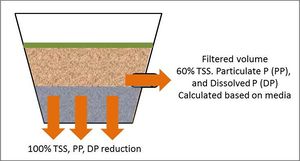
Difference between revisions of "Stormwater pollutant removal, stormwater credits"
m |
m |
||
| (15 intermediate revisions by the same user not shown) | |||
| Line 1: | Line 1: | ||
| − | [[File:schematic showing pollutant reduction calculations bioretention with underdrain.jpg|300px|thumb|alt=Schematic showing pollutant load reductions for infiltrated and filtration in Bioretention basin (with an underdrain)|<font size=3>Example schematic showing how pollutant load reductions are calculated for a bioretention basin with an underdrain. In this case, total volume, TSS and phosphorus credits are 100 percent for infiltrated water, while credits for filtered water (water captured by the underdrain) are 60 percent for TSS and are dependent on the media for phosphorus.</font size>]] | + | [[File:schematic showing pollutant reduction calculations bioretention with underdrain.jpg|300px|thumb|alt=Schematic showing pollutant load reductions for infiltrated and filtration in Bioretention basin (with an underdrain)|<font size=3>Example schematic showing how pollutant load reductions are calculated for a bioretention basin with an underdrain. In this case, total volume, TSS and phosphorus credits are 100 percent for infiltrated water, while credits for filtered water (water captured by the underdrain) are 60 percent for TSS and are dependent on the [http://stormwater.pca.state.mn.us/index.php/Phosphorus_credits_for_bioretention_systems_with_an_underdrain media for phosphorus].</font size>]] |
Credit refers to the stormwater runoff volume or pollutant reduction achieved toward meeting a runoff volume or water quality goal. Examples of goals include meeting the 1 inch volume reduction requirement in the Construction Stormwater General Permit and meeting TMDL pollutant reduction requirements. Credits can be achieved either by an individual BMP or cumulatively with multiple BMPs. | Credit refers to the stormwater runoff volume or pollutant reduction achieved toward meeting a runoff volume or water quality goal. Examples of goals include meeting the 1 inch volume reduction requirement in the Construction Stormwater General Permit and meeting TMDL pollutant reduction requirements. Credits can be achieved either by an individual BMP or cumulatively with multiple BMPs. | ||
| Line 5: | Line 5: | ||
The following pages provide information on stormwater volume and pollutant credits, pollutant removal achieved by individual BMPs, methods for calculating volume and pollutant reductions (credits), and example calculations. | The following pages provide information on stormwater volume and pollutant credits, pollutant removal achieved by individual BMPs, methods for calculating volume and pollutant reductions (credits), and example calculations. | ||
| + | *[[Information on pollutant removal by BMPs]] | ||
*[[Overview of stormwater credits]] | *[[Overview of stormwater credits]] | ||
| − | |||
| − | |||
*Credits for individual BMPs | *Credits for individual BMPs | ||
**[[Calculating credits for bioretention]] | **[[Calculating credits for bioretention]] | ||
**[[Calculating credits for green roofs]] | **[[Calculating credits for green roofs]] | ||
| − | **[[Calculating credits for infiltration | + | **[[Calculating credits for infiltration]] (basins and trenches) |
**[[Calculating credits for permeable pavement]] | **[[Calculating credits for permeable pavement]] | ||
**[[Calculating credits for tree trenches and tree boxes]] | **[[Calculating credits for tree trenches and tree boxes]] | ||
| Line 17: | Line 16: | ||
**[[Calculating credits for stormwater wetlands]] | **[[Calculating credits for stormwater wetlands]] | ||
**[[Calculating credits for sand filter]] | **[[Calculating credits for sand filter]] | ||
| + | **[http://stormwater.pca.state.mn.us/index.php/Calculating_credits_for_iron_enhanced_sand_filter Calculating credits for iron ehanced sand filter] | ||
| + | **[[Calculating credits for dry swale (grass swale)]] | ||
| + | **[[Calculating credits for wet swale (wetland channel)]] | ||
| + | **[[Calculating credits for stormwater and rainwater harvest and use/reuse]] | ||
| + | *[[Updates to credits and pollutant removal values]] | ||
| + | |||
| + | <noinclude> | ||
| + | [[Category:Level 3 - Best management practices/Guidance and information/Pollutant removal and credits]] | ||
| + | </noinclude> | ||
Latest revision as of 18:40, 13 December 2022

Example schematic showing how pollutant load reductions are calculated for a bioretention basin with an underdrain. In this case, total volume, TSS and phosphorus credits are 100 percent for infiltrated water, while credits for filtered water (water captured by the underdrain) are 60 percent for TSS and are dependent on the media for phosphorus.
Credit refers to the stormwater runoff volume or pollutant reduction achieved toward meeting a runoff volume or water quality goal. Examples of goals include meeting the 1 inch volume reduction requirement in the Construction Stormwater General Permit and meeting TMDL pollutant reduction requirements. Credits can be achieved either by an individual BMP or cumulatively with multiple BMPs.
The following pages provide information on stormwater volume and pollutant credits, pollutant removal achieved by individual BMPs, methods for calculating volume and pollutant reductions (credits), and example calculations.
- Information on pollutant removal by BMPs
- Overview of stormwater credits
- Credits for individual BMPs
- Calculating credits for bioretention
- Calculating credits for green roofs
- Calculating credits for infiltration (basins and trenches)
- Calculating credits for permeable pavement
- Calculating credits for tree trenches and tree boxes
- Calculating credits for stormwater ponds
- Calculating credits for stormwater wetlands
- Calculating credits for sand filter
- Calculating credits for iron ehanced sand filter
- Calculating credits for dry swale (grass swale)
- Calculating credits for wet swale (wetland channel)
- Calculating credits for stormwater and rainwater harvest and use/reuse
- Updates to credits and pollutant removal values
This page was last edited on 13 December 2022, at 18:40.